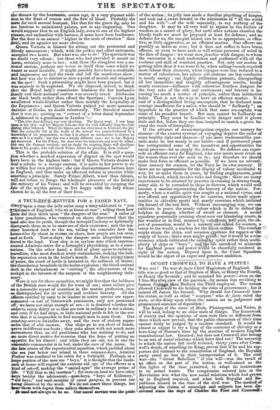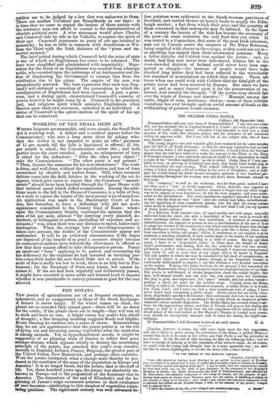• OUGHT CROMWELL TO HAVE A STATUE?
WHY not ? He was tic facto Chief Magistinte of England. His title was as good as,that of Stephen of Blois or Henry the Fourtk or Henry the Seventh; and he acquired his power—even on the Ultra-Royalistgiew of the question—by means less revolting to human feni4nothan Richard the Third employed. The nation allowed-Cromwell-to die hOlding the reins of government ; but.it turned oklames the Second. -Why should not Cromwell have his statue, as well as other " usurpers" who de facto ruled the state, or the King upon whom the nation sat in judgment anti pronounced sentence of deposition ? The Kings of the races of Blois, Plantagenet, and Tudor, it will be said, belong to an older state of things. The framework of society and the opinions of men were then so different from those which now prevail, that the public characters of -their time cannot fairly be judged by a modern standard. It would be almost as unjust to try a king of the centuries of chivalry as a hero-king of Homer's time by the maxims of modern E guise constitutional law. Granted; but does not Cromwell also belong to an rera of social relations which have died out ? The necessity to which the nation felt itself reduced, thirty years after Crom- well's death, of expelling its King, proves that if he and his sup- porters did violence to the constitution of England, the Royalist party erred no less in their interpretation of it. The civil war—the " Great Rebellion " if you will—was the result of an effort on the part of the nation, as well-aimed as the dim lights of the time permitted, to adapt its institutions to its actual wants. The compromise entered into at the Revolution was what the new social relations which had grown up in England required, and what both Royalist and Re- publican missed in the time of the civil war. The method.of adjusting the claims of sovereign and subjects has been &- covered .siaox the days of Charles -the First and Cromamdi; :neither are to be judged by a law that was unknown to them. 'There are ;neither Cavaliers nor Roundheads in our days : it is time that we come to regard the leaders of those parties with the tolerance men can afford to extend to the representatives of ;obsolete political sects. A wise statesman would place Charles and Cromwell side by.side in his Valhalla, to express the spirit of their age. Cromwell represents no party of our age inimical to monarchy : he has as little in common with Jacobinism as Wil- liam the Third with the Irish idolaters of the "pious and im- mortal memory."
The hrief period during which Cromwell held the reins of state is one of which no Englishman has cause to be ashamed. The laws were simplified and administered with impartiality. Repa- ration for the blood of an Englishman was exacted from a foreign -noble, who counted upon the patronage of an Ambassador and the fear of displeasing his Government to exempt 'him from the retribution due to his crime. The empire of the seas was triumphantly asserted. The bare expression that such was Eng- land's will enforced a cessation of the persecution to which the coreligionists of Englishmen had been exposed. A just, a •gene- rous, and a daring spirit, characterized Cromwell's exercise of power, however he might come by it. Cromwell is the practical, just, and religious spirit which animates Englishmen when thrown upon their own resources, embodied in an individual. A statue of Cromwell is the aptest emblem of the spirit of his age that can be conceived.



























 Previous page
Previous page